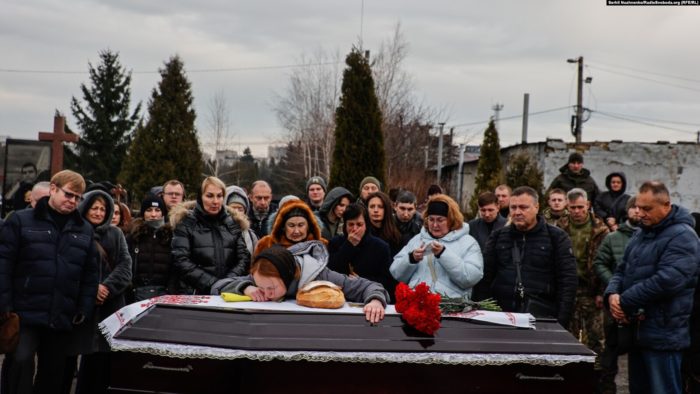There can be no peace without accountability. It means holding the perpetrators responsible for the violations they committed and restoring the right to justice for all those affected, ensuring fair compensation and restoration. Accountability for Ukraine should include a comprehensive system of measures to be implemented.
Impunity serves as a gateway to further atrocities. The absence of accountability for transgressions has a historical tendency to embolden the offender – the notorious appeasement strategy, aimed at preserving peace, instead led to World War II, immense suffering, and the loss of millions of lives due to warfare and genocidal policies. Ignoring Russia's repeated acts of aggression against its neighbors enabled the occupation of Crimea and Eastern Ukraine in 2014, paving the way for a full-scale invasion in 2022. The unavailability of a comprehensive accountability framework for crimes committed during the Bosnian War has left victims pursuing justice, truth, and compensation nearly three decades after the conflict's conclusion.
Ensuring justice for victims and fairness in punishment: The importance of judicial accountability
Suddenly, the Ukrainian judiciary system found itself overwhelmed with a surge of war-related cases. As no system could handle this without special preparation, it's vital to examine the potential obstacles that may impede the process and determine how to prevent them from resulting in impunity.
- Firstly, the domestic system's limited capacity poses a challenge. As of December 22, the General Prosecutor's Office has reported over 50,000 recorded war crimes, with the number continuing to rise. Capacity constraints also affect the knowledge and experience of law enforcement, investigators, prosecutors, and judges, as well as the availability of essential equipment to collect and preserve evidence. Ukraine will require assistance from state partners and international organizations in the form of financial support, capacity building, expertise, and teams of delegated experts.
- Potential gaps in national criminal law and procedure could also present challenges. For instance, the Ukrainian Criminal Code does not currently include provisions for crimes against humanity. Amendments to align Ukrainian criminal legislation with international criminal law standards should be implemented.
- Limited access to occupied territories or active combat zones is another issue that must be considered. Evidence is being destroyed, as seen in Mariupol, where buildings deliberately targeted by Russian shelling and missile attacks, resulting in numerous civilian casualties, are being demolished.
Conversely, the international community rapidly mobilized to hold Russian perpetrators accountable. A notable example is the referral of the situation in Ukraine to the International Criminal Court (ICC)
by 43 states. While the ICC, due to its complementary nature and limited capacity, may not be able to handle a large number of cases, it is crucial for the Court to prosecute some cases involving individuals who could evade domestic accountability due to their immunities.
Some cases, particularly those involving allegations of direct and public incitement to genocide, transferring children between groups, and intentionally targeting civilian infrastructure to spread terror among the population and create unlivable conditions, would be especially suited for examination by the ICC.
However, the International Criminal Court lacks jurisdiction over Russia's 2014 aggression against Ukraine. Without alternative accountability measures, impunity could continue for crimes that led to war crimes, crimes against humanity, and genocide. As a result, it is crucial to establish a Special Tribunal for the Crime of Aggression to hold all individuals, regardless of their high government positions or status, accountable. This includes officials from other states, such as Belarus and Iran, who participated in the aggression and should not be overlooked.
We have a dream: why the world needs a Special Tribunal for the Crime of Aggression against Ukraine
Non-judicial measures are no less important, offering a wider range of remedies to restore rights and provide justice in cases where courts have no jurisdiction
Not all cases will go to any type of judicial body for various reasons, such as a lack of evidence or the affected person's reluctance to go through a judicial procedure. Truth and reconciliation commissions will allow people to share their stories and be heard.
Reparations
, both judicial and non-judicial, should include restitution, compensation, and rehabilitation. However, all governmental systems are overwhelmed, including social security and medical systems, which might affect the implementation of rehabilitation procedures. There is currently no comprehensive strategy on reparations - a "persons affected by the conflict" category should be clearly defined in Ukrainian legislation to proceed with any remedy.
People who had to flee due to the war, as well as those who were deported and forcibly transferred to Russia and Belarus, should be provided with support to make their return easier or even possible. The Ukrainian side does not have verified information on these people and has no access to them on Russian territory, as there are no Ukrainian diplomatic missions. Moreover, Russia refused Switzerland as an intermediary and hinders access for international organizations. People are forced to endure humiliating filtration procedures in occupied territories and Russia and to spend days on the road to return to Ukraine or Europe. This especially concerns children, as they are unable to leave Russia on their own, and the Russian government has implemented legislation simplifying the adoption process.
The processes of returning remains, exhumation, reburial, erecting tombstones for deceased relatives, issuing death certificates, searching for missing persons, and holding ceremonies for the disappeared should also be ensured. These processes are affected by the fact that the Ukrainian government does not have access to occupied territories, and the evidence is being destroyed either deliberately or due to abandonment or lack of care on the Russian side.
Commemorations or days of remembrance
should be established, raising awareness and providing information about the war and committed violations. Moreover, guarantees of non-repetition, including security guarantees, should also be part of the process.
Financial capacity is also a concern for compensation. The Ukrainian state budget is already severely damaged by the cost of war and is experiencing negative effects on the economy, considering the number of businesses destroyed or unable to operate due to electricity cuts, as well as the amount of equipment and product, such as grain, stolen by Russia. Ensuring the seizure of Russian assets in different countries and creating a mechanism for those assets to be used in reparation procedures will be essential.
Ukraine should be at the forefront of the accountability process, but it will be impossible to fulfill without the international community's help. The international community should support Ukraine in its ability to effectively face the aggression, put pressure on Russia to cease violations, de-occupy sovereign Ukrainian territory within its internationally recognized borders, and provide all the information and resources needed to restore the rights of people affected by the armed conflict.
If implemented fully and as a comprehensive system, these measures should address the needs and rights of victims, including their access to justice and reparations.
However, the current system, which allows an aggressor state to repeatedly escape accountability and remain a member of the UN Security Council, is unimaginable. Working further on fighting impunity and establishing an effective international security system, capable of preventing human rights violations rather than merely reacting to them, should be a priority.

Onysiia Syniuk is a legal analyst at the Ukrainian Human Rights Center Zmina.
Related:
- ICC arrest warrant for Putin: what’s next, and do we still need a Tribunal? Human rights defender answers
- Tribunal for Putin: a guide to holding Russia’s leadership accountable for war crimes in Ukraine
- How Ukraine is preparing a Tribunal for Putin
- It is time to accuse Putin of rape – human rights lawyer
- We have a dream: why the world needs a Special Tribunal for the Crime of Aggression against Ukraine
- Deportation in the 21st century: what you need to know about Russia’s crime in Ukraine
- Deportation as a crime: how human rights defenders document evidence and help Ukrainians escape Russia
- How Russia deports orphanages and prisons from the occupied territories of Ukraine

